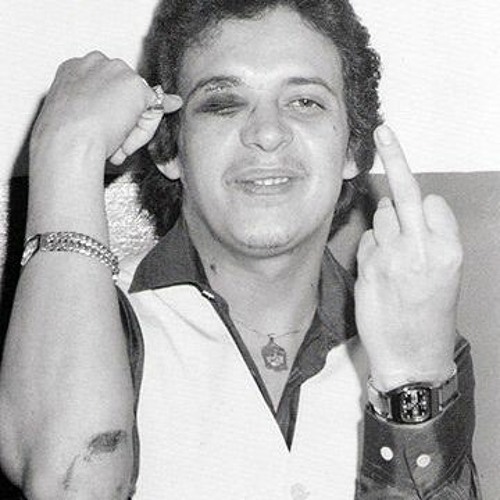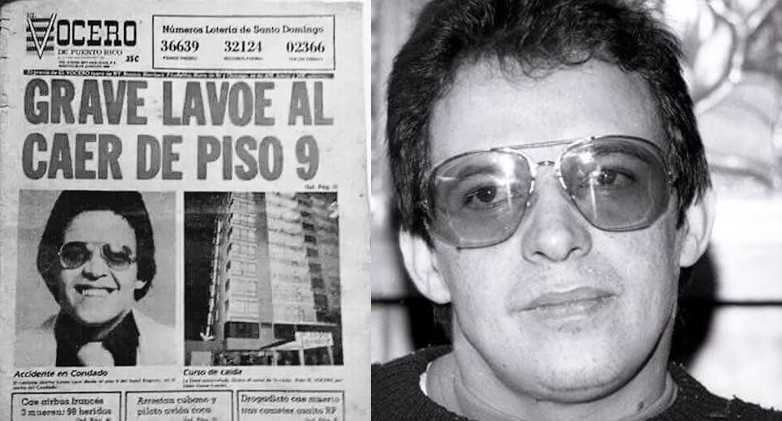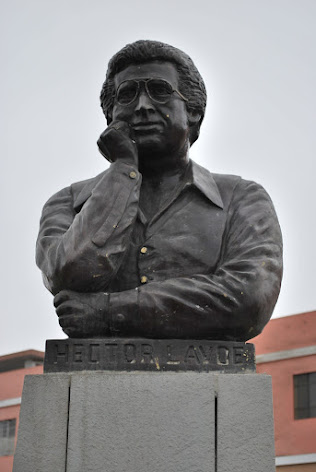Héctor Lavoe - 1978 - Comedia


Héctor Juan Pérez Martínez (30 September 1946 – 29 June 1993),[3] better known as Héctor Lavoe, was a Puerto Rican salsa singer. Lavoe, know also as “Cantante de los Cantantes” (Singer of the singers) is considered to be possibly the best and most important singer and interpreter in the history of salsa music because he helped to establish the popularity of this musical genre in the decades of 1960s, 1970s and 1980s. His personality, style and the qualities of his voice led him to a successful artistic career in the whole field of Latin music and salsa during the 1970s and 1980s. The cleanness and brightness of his voice, coupled with impeccable diction and the ability to sing long and fast phrases with total naturalness, made him one of the favorite singers of the Latin public.
Lavoe was born and raised in the Machuelo Abajo barrio of Ponce, Puerto Rico. Early in his life, he attended Escuela Libre de Música de Ponce, known today as the Instituto de Música Juan Morel Campos and, inspired by Jesús Sánchez Erazo, developed an interest in music. He moved to New York City on 3 May 1963, at the age of sixteen. Shortly after his arrival, he worked as the singer in a sextet formed by Roberto García. During this period, he performed with several other groups, including Orquesta New York, Kako All-Stars, and Johnny Pacheco's band.
In 1967, Lavoe joined Willie Colón's band as its vocalist, recording several hit songs, including "El Malo" and "Canto a Borinquen." Lavoe moved on to become a soloist and formed his own band performing as lead vocalist. As a soloist, Lavoe recorded several hits including: "El cantante" composed by Rubén Blades , "Bandolera" composed by Colón, and "Periódico de ayer", composed by Tite Curet Alonso. During this period he was frequently featured as a guest singer with the Fania All Stars recording numerous tracks with the band.
In 1979, Lavoe became deeply depressed and sought the help of a high priest of the Santería faith to treat his drug addiction. After a short rehabilitation, he relapsed following the deaths of his father, son, and mother-in-law. These events, along with being diagnosed with HIV, drove Lavoe to attempt suicide by jumping off a Condado hotel room balcony in San Juan, Puerto Rico. He survived the attempt and recorded an album before his health began failing. Lavoe died on 29 June 1993, from a complication of AIDS.
Today we bring you 'Comedia', his best album with musical content rich in Latin rhythms and everything that identifies us as owners of this blessed land, as it is: Latin America.
Héctor Lavoe was known the famous "Singer of the Singers", but in 1977 he was not yet known by that artistic name, so this album that we have brought you on this occasion has a deeper history and Like Chaplin , Lavoe went into self-imposed exile in 1977 due to serious depression problems, which led him to leave the stage after his great successes between 1970-1976. But one of the best ways to rekindle that flame of the great musician that Lavoe was, it was, of course, music. This is when Willie Colón arrives to show off all his skills as a producer, achieving a complete facelift of his former partner in “misdeeds” with his orchestra between 1967-1973. In this album we find wonderful songs and we walk through genres such as Bomba, Samba, Bossa Nova, Bolero, Guaguancó, Son Montuno and some flashes of Jazz under the arrangements of Willie Colón, José Febles, Luis "Perico" Ortiz and Edwin Rodriguez. Nowadays, a classic such as "El Cantante" by Ruben Blades and arranged by Colón is still heard. Colón himself was the one who contacted Blades, since both had been working since 1975 and by the end of 1977 they were working as an official duo (of his works we can remember the wonderful “Siembra” from 1978, an album considered the best in the history of salsa).
“El Cantante” was definitely an immediate success on all Latin music charts in the United States and Latin America, becoming the song that would consecrate Héctor Lavoe and lead him to be a music legend. Lavoe adopted it as his own and imprinted all his feelings on it, an autobiographical lyrics by Blades for himself, but Héctor could see how his life was reflected in such a composition, achieving a classic, where he ends up imposing his best phrases for posterity.
Then we can find songs like “La Verdad” written by Yin Carrizo, also arranged by Willie Colon , full of Samba and Son Montuno, the explosive “Bandolera” composed by Victor Cavalli and arranged by the late José Febles , with a majestic piano solo by Gilberto “Pulpo” Colón and the explosive voice of Lavoe in his soneos. The heartbreaking bolero “Because I met you” arranged by Edwin Rodriguez. And the well-remembered “Songoro Cosongo” arranged again by the mythical José Febles , a song where you can see that Lavoe came from the old school.
This album was recorded in the studios of La Tierra Sound Studios in New York, in which musicians participated in addition to those already mentioned above, such as: Salvador Cuevas , José Rodriguez , Reynaldo Jorge , Jose Mangual Jr , Eddie Montalvo (Except in "El Cantante ” and “La Verdad”), Milton Cardona (Only in “El Cantante” and “La Verdad”) José Signo , Steve Berrios (Only in “El Cantante” & “La Verdad”) and Eddie Natal. It was mixed entirely by Willie Colon himself , except for the song "Bandolera" which was mixed by Jon Fausty . The album's original photography was by Yoshi Ohara and original design by Michael Ginsburg/Gazebo Group with art direction by Alberta Dering.
TRACKLIST
A1 El Cantante 10:17
Written-By – Ruben Blades
A2 Comedia 3:21
Written-By – José A. Espinosa
A3 La Verdad 5:30
Written-By – Yin Carrizo
A4 Tiempos Pasados 4:23
Written By – D.R.
B1 Bandolera 9:32
Written-By – Victor Cavalli
B2 Porque Te Conoci? 4:45
Written By – D.R.
B3 Songoro Consongo 7:46
Written-By – Eliseo Grenet, Nicolás Guillén
Credits
Voice - Hector Lavoe
Backing Vocals - Héctor Lavoe , Willie Colón , José Mangual Jr. , Milton Cardona (On " El Cantante " and " La Verdad ") and Eddie Natal
Trombones - José Rodríguez and Reinaldo Jorge
Trumpets - Luis “Perico” Ortiz (Trumpet solo on « Bandolera ») , José Febles and Lew Soloff (Trumpet solo on « El Cantante »)
Bongo - Jose Mangual Jr.
Conga - Eddie Montalvo (Except in " El Cantante " and " La Verdad ") and Milton Cardona (In " El Cantante " and " La Verdad ")
Drums - Jose Signo (Except in " El Cantante " and " La Verdad ")
Timbales - Steve Berrios (In « El Cantante » and « La Verdad ») and José Mangual Jr. (In « Tiempos Pasados »)
Percussion - Steve Berrios (On " El Cantante " and " La Verdad ")
Piano and Electric Piano - Gilberto “Pulpo” Colón Jr.
Bass - Salvador Cuevas* Acoustic guitar - José Febles (Only for the song « Past Times »)
Violin - Alfredo de La Fe
Producer - Willie Colon
Musical arrangements – Willie Colón , Luis “Perico” Ortiz, José Febles and Edwin Rodríguez
Symphonic Arrangements - Marty Sheller
Sound Engineer – Jon Fausty, Mario Salvati and Irv Greenbaum
Musical mix - Willie Colón and Jon Fausty (For « Bandolera »)
Original Album Photography - Yoshi Ohara
Original LP Cover Design - Michael Ginsburg/Gazebo Group
Art Director - Alberta Dering



.jpg)





.jpg)



